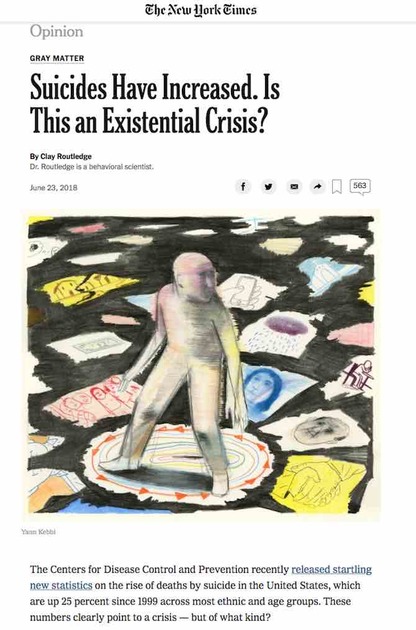
I wanted to share excerpts from this New York Times article by Clay Routledge. It touches on many important themes including the role of meaning, community, contributing, family, and religion.
I touched on some of these themes in the following blogposts.
https://nefesh.org/ChaimNeuhoff/footsteps-ii.html. Related to the loneliness and despair of those who have left Orthodoxy.
https://nefesh.org/ChaimNeuhoff/askanim-and-cultural-values.html. Related to the role of community in Orthodox/Chassidic culture.
Excerpts of article are courtesy of Ken Pope
The New York Times includes an article: "Suicides Have Increased. Is This an Existential Crisis?” by Clay Routledge.
Here’s the author note: "Dr. Routledge is a behavioral scientist.”
Here are some excerpts:
[begin excerpts]
The Centers for Disease Control and Prevention recently released startling new statistics on the rise of deaths by suicide in the United States, which are up 25 percent since 1999 across most ethnic and age groups. These numbers clearly point to a crisis — but of what kind?
Many argue that this is a crisis of mental health care, that people are not getting the services they need. The proposed solution is better therapies, more effective antidepressants and greater access to treatment.
This assessment may be correct. However, the suicide rate has increased even as more people are seeking treatment for depression and anxiety, and even as treatment for those conditions has become more widely available. An additional explanation seems to be needed.
As a behavioral scientist who studies basic psychological needs, including the need for meaning, I am convinced that our nation’s suicide crisis is in part a crisis of meaninglessness.
Fully addressing it will require an understanding of how recent changes in American society — changes in the direction of greater detachment and a weaker sense of belonging — are increasing the risk of existential despair.
<snip>
The neurological machinery that has helped us survive has also rendered us distinctively ruminative. Our capacity to reflect on ourselves, to think about the past and the future and to engage in abstract thought has given us access to some uncomfortable truths: We know that we and everyone we care about will age, become frailer and die. We recognize that life is uncertain. We understand that pain and sorrow are part of our destiny. What is the point of it all?
In order to keep existential anxiety at bay, we must find and maintain perceptions of our lives as meaningful. We are a species that strives not just for survival, but also for significance. We want lives that matter. It is when people are not able to maintain meaning that they are most psychologically vulnerable.
Empirical studies bear this out. A felt lack of meaning in one’s life has been linked to alcohol and drug abuse, depression, anxiety and — yes — suicide. And when people experience loss, stress or trauma, it is those who believe that their lives have a purpose who are best able to cope with and recover from distress.
How do we find meaning and purpose in our lives? There are many paths, but the psychological literature suggests that close relationships with other people are our greatest existential resource. Regardless of social class, age, gender, religion or nationality, people report that the life experiences they find most personally meaningful typically involve loved ones.
Critically, studies indicate that it isn’t enough to simply be around or even liked by other people. We need to feel valued by them, to feel we are making important contributions to a world that matters. This helps explain why people can feel lonely and meaningless even if they are regularly surrounded by others who treat them well: Merely pleasant or enjoyable social encounters aren’t enough to stave off despair.
All of which brings us to the changing social landscape of America. To bemoan the decline of neighborliness, the shrinking of the family and the diminishing role of religion may sound like the complaining of a crotchety old man.
Yet from the standpoint of psychological science, these changes, regardless of what you otherwise think about them, pose serious threats to a life of meaning.
Consider that Americans today, compared with those of past generations, are less likely to know and interact with their neighbors, to believe that people are generally trustworthy and to feel that they have individuals they can confide in. This is a worrisome development from an existential perspective: Studies have shown that the more people feel a strong sense of belongingness, the more they perceive life as meaningful. Other studies have shown that lonely people view life as less meaningful than those who feel strongly connected to others.
Something similar is at stake in the decreasing size of the family. Americans today are waiting longer to marry and have children, and are having fewer children. This may be a desirable state of affairs for many people (though evidence suggests that American women are having fewer children than they want). Nonetheless, researchers have found that adults with children are more focused on matters of meaning than are adults who do not have children, and that parents experience a greater sense of meaningfulness when they are engaged in activities that involve taking care of children.
As for religion, which has long provided the institutional and social scaffolding for a life of meaning, it, too, is in steep decline. Americans these days, especially young adults, are less likely to identify with a religious faith, attend church or engage in other religious practices. But as my research has shown, the sense of meaningfulness provided by religion is not so easily replicated in nonreligious settings: When Americans abandon traditional houses of worship, they increasingly search for alternative religious-like experiences (including those involving ideas about ghosts or space aliens) in order to feel as if they are part of something larger and more meaningful than their brief mortal lives.
There is even reason to think that America’s existential crisis may be contributing to our rancorous political divisions. Studies show that when presented with existentially threatening ideas (such as reminders of their mortality), people respond with increased bias toward their own worldview, particularly if they are not finding meaning in their life through other sources. In this way, our fractious political culture may be fueled not just by ideological disagreement, but also by a desperate search, common to all lost souls, to find meaning anywhere we can.
[end excerpts]
The article is online at:
 Previous
Previous

